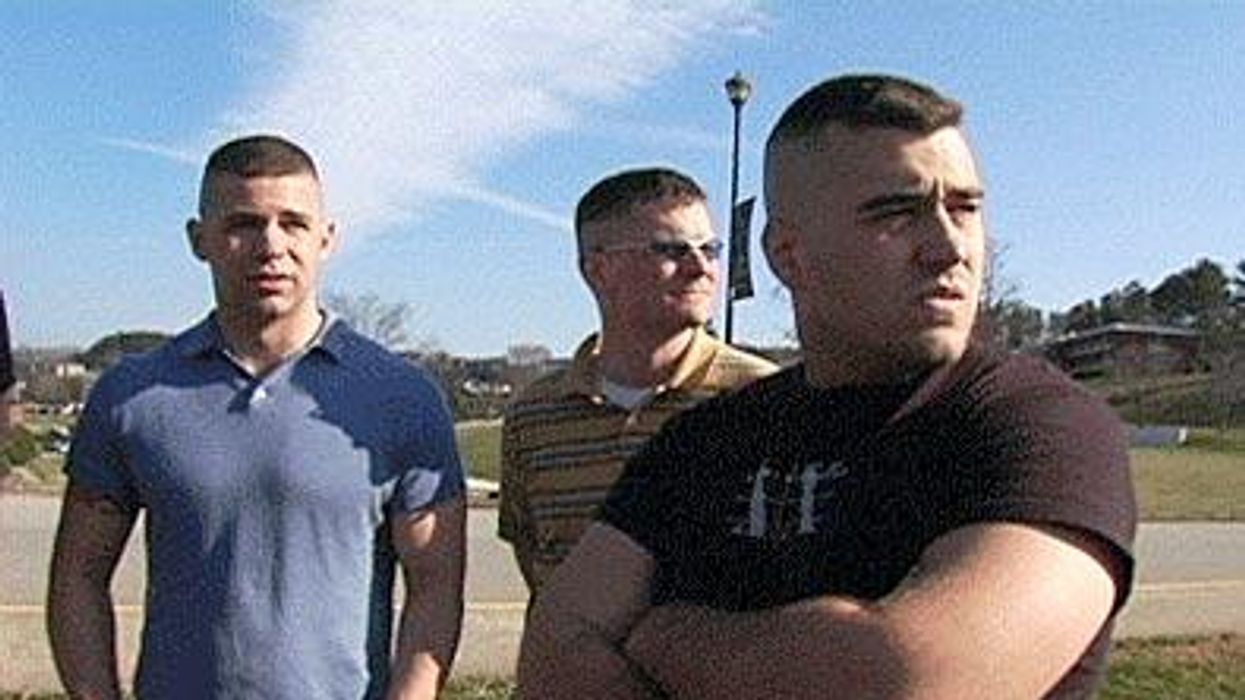
July 22 2010 10:35 AM EST
By continuing to use our site, you agree to our Privacy Policy and Terms of Use.

Servicemembers United executive director Alex Nicholson, an Army human intelligence collector who was discharged in 2002, resumed testimony on Wednesday in a federal lawsuit challenging "don't ask, don't tell."
As expected, Justice Department attorneys defending the case in a Riverside, Calif., courtroom devoted their cross-examination to whether Nicholson had valid membership in the Log Cabin Republicans, which filed the suit in 2004. During opening statements last week, assistant U.S. attorney Paul Freeborne said that Log Cabin has no standing to sue on behalf of those affected by the policy.
In its case Log Cabin has identified two individuals who claim to be members: Nicholson and an anonymous Army Reserves lieutenant colonel who continues to serve in the military.
During a short cross-examination, Nicholson confirmed that he had never paid official dues to Log Cabin, nor did he self-identify as a Republican, though he has voted for GOP candidates. He testified that he had donated $60 to the organization and had addressed attendees at the 2006 convention at the request of its leaders.
Nicholson also testified that he first warmed to Log Cabin when he and Jarrod Chlapowski cofounded Servicemembers United in 2005; it was the first time an established gay rights group supported their cause, he said.
Regarding his military experience, Nicholson told the court that he was close to completing his training as a human intelligence collector for the Army when he was discharged under "don't ask, don't tell." Fluent in Spanish, Portuguese, and Italian when he was honorably discharged, Nicholson said he later learned Arabic in college and acquired a Defense Department scholarship to study abroad in Egypt for his junior year.
While Justice Department lawyers in their questioning implied that Nicholson could not be considered an asset to the Army because he had not finished his training and was not fluent in Arabic when he was discharged, Nicholson said the questions missed the broader point of why DADT harms the military.
"Military assets come down to human beings," Nicholson told The Advocate following his testimony. "Few people are brought into the military for their existing skills. We all come to the military and are screened for an aptitude to evaluate what we can do to our best abilities. In discharging me and many others, they're losing an asset. They lost a talented person with potential."
Following Nicholson's testimony, Alan Okros, a professor at the Canadian Forces College of National Defense in Toronto, testified about the Canadian military's experience in integrating gay service members beginning in 1992. Okros said that the government used the integration of women in the military during the 1980s as a model for allowing gays and lesbians to serve openly.
Okros cited the case of Capt. Michelle Douglas, who in 1990 was discharged under Canada's own legal prohibitions for out gay soldiers. The Canadian military dropped the ban shortly before a lawsuit brought by Douglas went to trial.
Integrating openly gay soldiers, Okros testified, was largely a nonevent in the Canadian forces. A 1993 RAND Corp. study of the Canadian military reached a similar conclusion -- that there were "no resignations (despite previous threats to quit), no problems with recruitment, and no diminution of cohesion, morale, or organizational effectiveness."
But during cross-examination, Justice attorney Ryan Parker quoted Lt. Gen. Calvin Waller, who said during the 1993 DADT congressional hearings that if the United States were to base its policies on that of other nations, "we do a grave disservice." Parker then noted that the U.S. military has 25 times more troops than Canada's armed forces, which comprises about 100,000 active duty and reserve members.
Ending the day's testimony was former Air Force sergeant Anthony Loverde, who served seven years and accelerated through the ranks at a faster pace than his peers. While he was earning honors and promotions in his technical field, Loverde said he still had to lie to others who asked whether he was gay in order to protect his career.
This did not stop him from dropping clues that he was gay, from wearing "flashy outfits" to avidly watching Will & Grace to saying that he preferred girls with "deep voices and broad shoulders" when his fellow airmen asked what kind of women he was attracted to. While ultimately he did have to conceal his sexual orientation, being open about his identity as a person who was "a little different," Loverde testified, actually helped morale and cohesion.
"In my flight when I would give hints and be more open, people were more willing to come to me and talk to me for help" both for work and their personal life, Loverde said. "They could come to me, knowing they could trust me."
Charlie Kirk DID say stoning gay people was the 'perfect law' — and these other heinous quotes